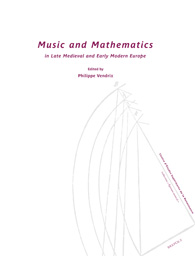
Ouvrages parus
The idea that music as a concept underwent profound upheavals during the Renaissance, following a reconstruction of the “alliance of the arts,” has gained ground to the point of being generally accepted today. It is particularly pertinent that this idea reinforces a presupposition inspired by Burckhardt, according to which the Renaissance emerged in Italy during the 15th century and experienced its most developed manifestations in the 16th century. Whatever the validity of such a hypothesis, it has been accepted by numerous musicologists. Expanded and freed from its purely theoretical constraints, this historical interpretation continues to enjoy success at the heart of the discipline of musicology, a success which is to say the least surprising, even as it remains difficult to accept. The Renaissance was supposedly the scene of a fruitful and innovative rereading of the links between text and music; as such, it responds to the demands of a rebirth, updating an enterprise which had driven on ancient musicians and poets. Adopting such a perspective could nevertheless seem somewhat reductive. Above all, it implies that one subscribes to the concept of a humanist utopia, regarding which the historian of ideas—and likewise, clearly, the historian of music—can only remain doubtful.
This introduction is intended as a critique of the position outlined above, questioning more specifically what relations can really exist, from a theoretical standpoint alone, between theories of language and theories of music. My remarks will thus alternate deliberately between general principles and detailed analyses, but in no way claim to lead to an irremediably definitive conclusion. I will attempt rather to respond to a double question, simple in formulation but complex in its implications: did the theory of language (or poetic theory) presuppose a modification of the music-theoretical enterprise in the Renaissance? If so, in what manner? If not, then where do we find a conceptual model capable of describing the work carried out by music theorists during the 15th and 16th centuries to account for discoveries and innovations?
Philippe Vendrix
|
Music and Mathematics in Late Medieval and Early Modern Europe Edited by Philippe Vendrix Turnhout, Brepols Publishers, 2008 Collection Épitome musical ISBN 978-2-503-51597-7, 394 pages, 18 x 23,5 cm |
 |
This introduction is intended as a critique of the position outlined above, questioning more specifically what relations can really exist, from a theoretical standpoint alone, between theories of language and theories of music. My remarks will thus alternate deliberately between general principles and detailed analyses, but in no way claim to lead to an irremediably definitive conclusion. I will attempt rather to respond to a double question, simple in formulation but complex in its implications: did the theory of language (or poetic theory) presuppose a modification of the music-theoretical enterprise in the Renaissance? If so, in what manner? If not, then where do we find a conceptual model capable of describing the work carried out by music theorists during the 15th and 16th centuries to account for discoveries and innovations?
Philippe Vendrix

Programme Ricercar : 59, rue Néricault-Destouches — BP 11328 — 37013 TOURS Cedex — France
T 33 (0)2 47 36 77 84 — F 33 (0)2 47 36 77 62 — M ricercar@univ-tours.fr







